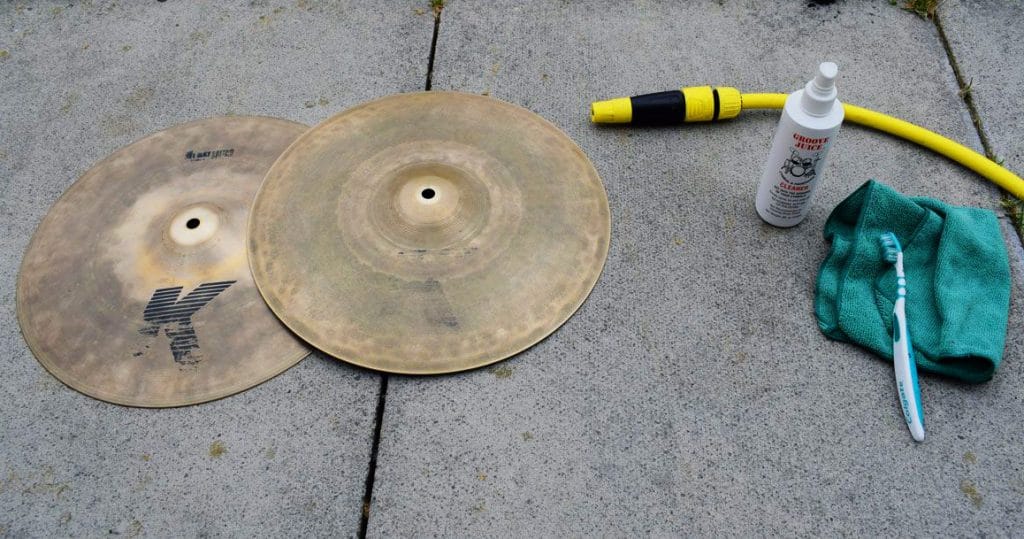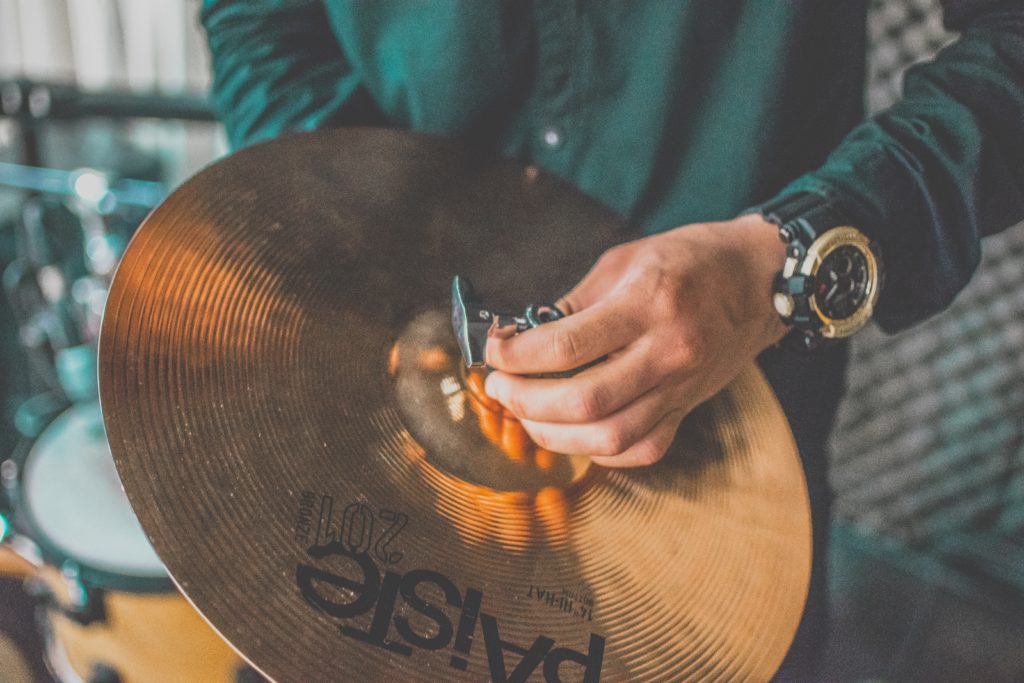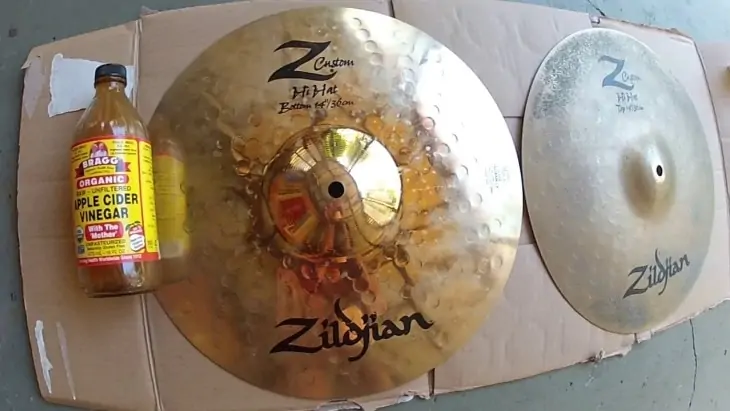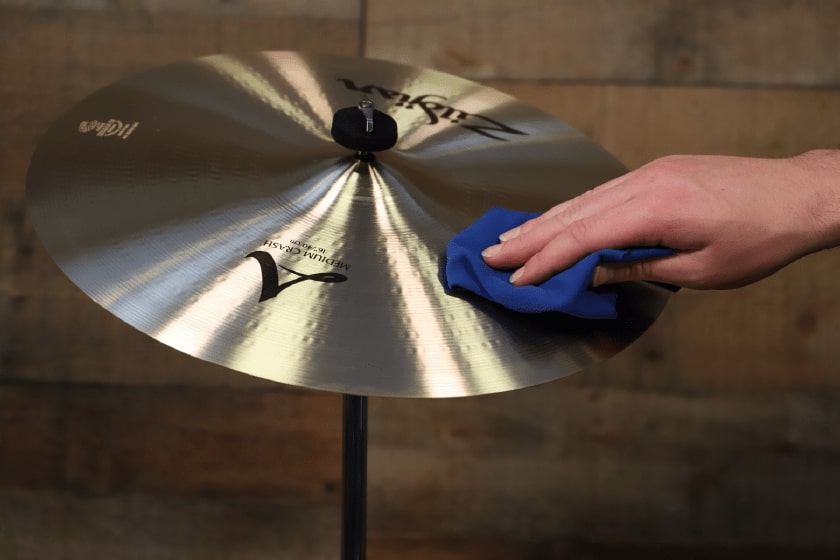Part of being a good drummer is knowing how to keep your components in check. And this means keeping everything safe from damages that come from too much dirt.
Cymbals are a very important aspect of every drum set, and you want to make sure they are well protected. They can also be quite expensive, which means to don’t want your investment to go to waste.
It is unfortunate that most people underestimate clean drum cymbals power and how it affects the quality of sound. They don’t see much value in taking care of their cymbals.
This can cost you on the sound quality and durability of these products.
If you don’t clean your cymbals, you are only asking for trouble. Bad things like color changing, rust, and cracking will happen to them.
This could have been understandable in the past, where there were no specialized products for cleaning cymbals. Drummers were forced to use a brass polish, which is still largely applied, even though there are many other cymbal care methods.
Technology has brought us new ideas that make it easier and efficient.
In this guide, I will be sharing with you the best way to take care of your cymbals. Come along.
Why should you clean your cymbals?
Cleaning cymbals makes them look more attractive. But it’s not only for looks that you should keep your them polished. Dirty cymbals can look grubby and unattractive, which even reduces their life span and worth.
Besides, the dirt and oxidized metal that collects on the cymbals’ surface can change the sound of your cymbals. Bright sounding cymbals for brass and other light hitting music genres become muffed, which canaffect how much sound you get from them.
The last thing you want is having to strain to get good sound from the instrument because of something you can control. Also, your cymbals lose their ring and crispness. It is never a good feeling there.
A good drummer understands the tone of their instruments. It’s like they become one with their kit and will do everything to ensure their kits sound incredible.
If, therefore, you are looking for a more trashy, lo-fi, or punchy sound, try with dirty cymbals.
Although some may like such sound, it is never impressive for most of us.
For me, cleaning cymbals periodically is essential. The warm sound they give and the feeling of having something new make me feel proud.
Also, sometimes you may want to sell your cymbals are you upgrade to new ones. No one will want to look at dirty cymbals.
And if you let dirt and rust pile too much, it can lead to cracks on them. This makes it even harder for you to sell.
In other words, cleaning cymbals can save you money.
What is the best way to clean drum cymbals?
There are many ways of keeping cleaning your cymbals. Consider the following:
1. Brass Polishing

This is one of the most basic ways of cleaning the items. Like Zildjian, Paiste, and Sabian, many top companies have their own cymbal polishes. The secret here is to know which brand of cymbals you are using and applying the specified methods to avoid any further damages.
However, you can use any polish on any cymbals, and it will do just a fine job. Yes, they recommend that you use specific polishes, but that is just a way to get you buying the products.
Choosing the right polish for your cymbals is crucial. But since there are so many products on the modern market already, it might be a bit challenging to pick the right one.
What you need, in this case, is to understand about cymbals and gain as much knowledge about cleaning agents are possible.
There are several things to consider before choosing a polish:
Abrasive polishes
Cymbals feature different ratios of alloy used in their making. It may be hard to get the first-hand information on them, which is why some manufacturers insist you use their product.
Hence, it is crucial to understand that some brass polishes can have an abrasive reaction with your metal. This means you can easily remove the black labels from their surface without intension.
For some cymbals, you can go as far as hurting their actual faces and damages the tonal grooves. As stated earlier, most cymbals are designed with specific features to deliver specific tonal value, which is important in the type of music you may be playing.
Too much reaction can cause them to lose this value and end up not helping you anymore. And you don’t want that.
Choosing the wrong polish for your cymbal can have the worst results for you and your instruments. I use brass polishes in cleaning mine, but I am always careful with this information.
Not everyone will give you the right information
What makes cymbals cleaning even harder and dangerous is that there are so many “experts.” Just go online and try to search “cymbal polish,” you will see a whole bunch of results.
Everyone seems to have amagic cleaner that will resolve all your issues. For instance, there are those who will swear that Ziff’cymbal cleaner, or Brasso, or Wenol are the best for basic cymbal use. And hence, you will waste your time trying to find the perfect solution from these.
But some of these products will leave you with streaky looking cymbals that lose the value of your original sound.
One problem with brass and cymbal polishes is that they only focus on the alloys’ brass aspect. They forget all the other components, which leads to even more issues,
Well, brass is the main metal used in cymbals. But most cymbals have at least 15% brass and other percentages of tin, which should be considered as well.
The buffing process is not something to joke about either. And if you really want results, you just have to keep an eye on getting the perfect product. You want your cymbals to have as many of its original features as possible.
Don’t worry about this too much, though. Keep reading to discover more ways of keeping your cymbals clean and safe.
Even though there is a lot of information about cleaning cymbals, you will discover that the actual process is actually very easy. It is just like you washing the dishes.
- Put your cymbals in lukewarm water, with the right cymbal cleaner of polish. Make sure your polish comes from a reputable brand.
- Use a soft clean cloth or a specified non-abrasive metal cleaner and wipe away any clear areas of oxidation and dirt. Let your cymbal soak in the water for a few minutes to help loosen some dirt areas.
- Remove the cymbal from the water and place it a towel or piece of cloth. You can use unwanted towels.
- Apply the cymbal polish using a rag or a soft cloth and repeat as much as possible until everything is clear.
- Rinse the cymbal in warm water after ensuring a desired shiny surface. Make sure you rinse them thoroughly to remove any polish remains.
2. Other Cleaning Methods
Removing Grime

Suppose it is grime bringing the issues on cymbals. You can easily remove it without having to go through too much trouble.
Begin by fill a tub or basin with lukewarm water and add one teaspoon of mild dish soap. Mix them well until they are well combined.
Take the cymbals from their stands and soak them in the water for about two minutes. Make sure you have set every piece aside, and then gently tub until they are well submerged.
Let it soak as the soapy water will keep loosening the grime and oils. Repeat, one cymbal at a time while avoiding scratches.
Now scrub the cymbalusing a heavy nylon brush depending on the level of dirt. A little more elbow grease may be required for cymbals with extra buildup.
Wipe the cymbals clean using a soft towel. Keep them from more scratches by ensuring the cloth you use is soft enough.
What household item can I use to clean cymbals?

Sometimes you don’t need to buy an expensive agent or polish for cleaning your cymbals. Just look around your house. There are several items you use, and they will do a more-than-perfect job. Consider the following:
Lemon
Lemon has been used as a cleaning agent for many things around our homes. And cymbals are not different.
What makes them work is that they contain a certain acidity level that will slightly erode the metal, removing any dirt held on the surface.
And using lemon is quite easy. Just slice the lemon in the middle using a knife, and then thoroughly rub it on the cymbals until they are clean. Repeat as much as possible before rinsing with warm water.
Ketchup
This is another option that has been cited in many drum forums. I have never used it, but they say it’s handy.
It a much lighter duty option compared to lemon juice. It has a pH of 3.9 against 2.5 of lemon, which should be enough to keep your cymbals in perfect shape.
Squirt a boatload of ketchup on the cymbal and even it out. Allow it to rest for about 30 minutes before rinsing with warm water.
This will not affect the logo on your cymbals. It’s not very strong, and hence, you don’t have to worry.
Vinegar and Water
Vinegar and water are other options that have been used for many years. It has pretty consistent results too.
Vinegar has a pH scale of about 2.5, making it easy to work on your cymbals for the same reason. Water may not be very much necessary, but you may want to mix in a little, instead of pure vinegar.
Put your cymbals in a shallow tub and mix three parts of vinegar in one-part water. Allow the mixture to rest for about 30 minutes with the cymbals immersed, and then remove and dry with a soft cloth.
Frequently Asked Questions
How Do You Remove Oxidation From Cymbals?
The coating on your cymbals’ surface it temporary – applied by companies as protection during transit. It will eventually wear off, as the oxidation reaction takes place.
You can remove this effect by applying the right cleaning agent. Apply products like the Sabian cleaner or Groove Juice for a deeper clean.
Besides, most of the methods mentioned above will work perfectly.
How Do You Clean Cymbals Without Removing A Logo?
Choose a cymbal cleaning agent that does not cause too much reaction. Consider the household options mentioned above, for instance. They are not strong enough to remove a logo.
Also, use the recommended cleaner for specific cymbals. And do not use hard materials when rinsing or rubbing of dirt.
Conclusion
Cleaning cymbals should be part of making sure you get clean sounds from your drum set. The best way to ensure you have an easy time is to clean them lightly after every use or when you stored them. Protect your cymbals, and they will protect you.





